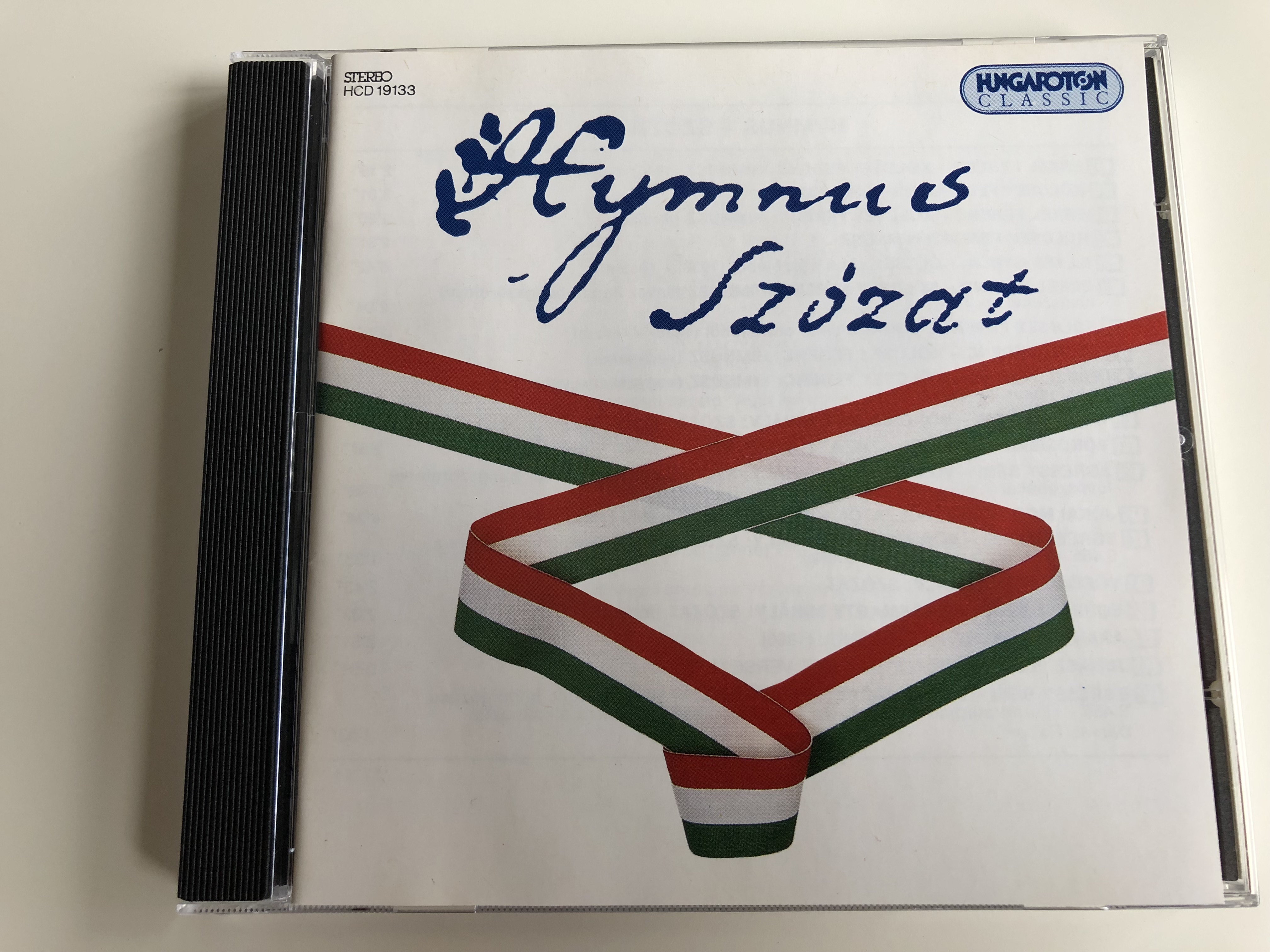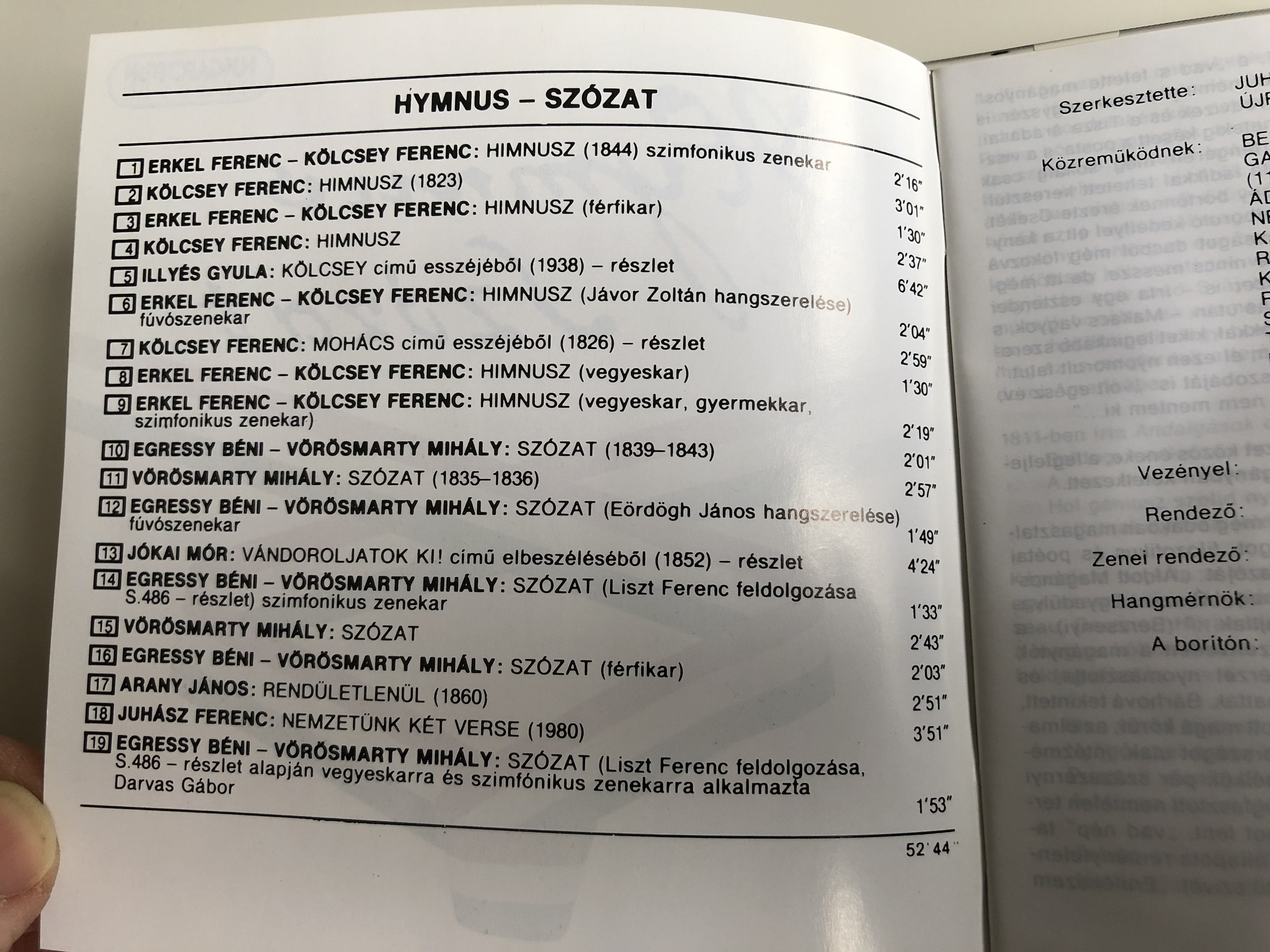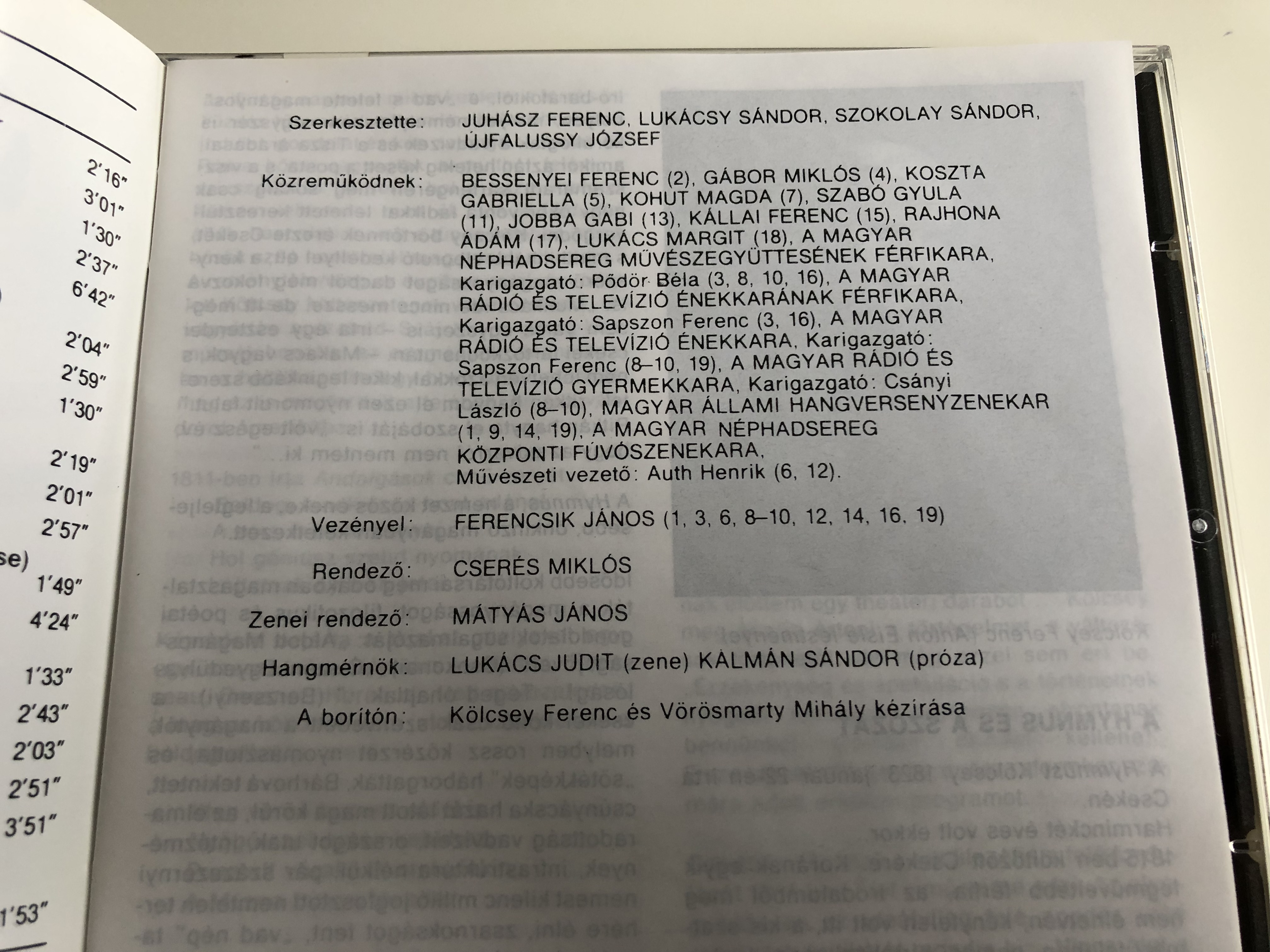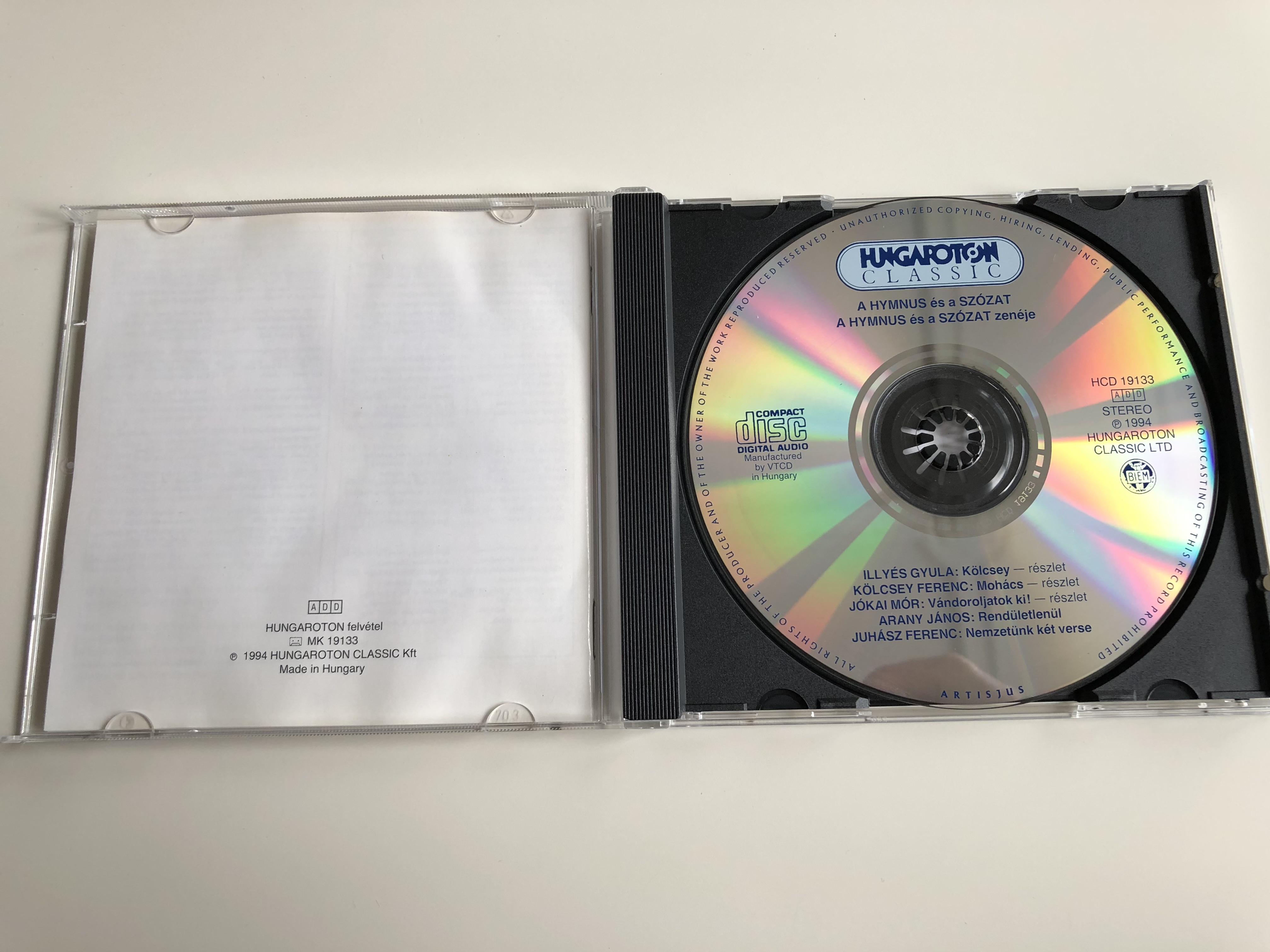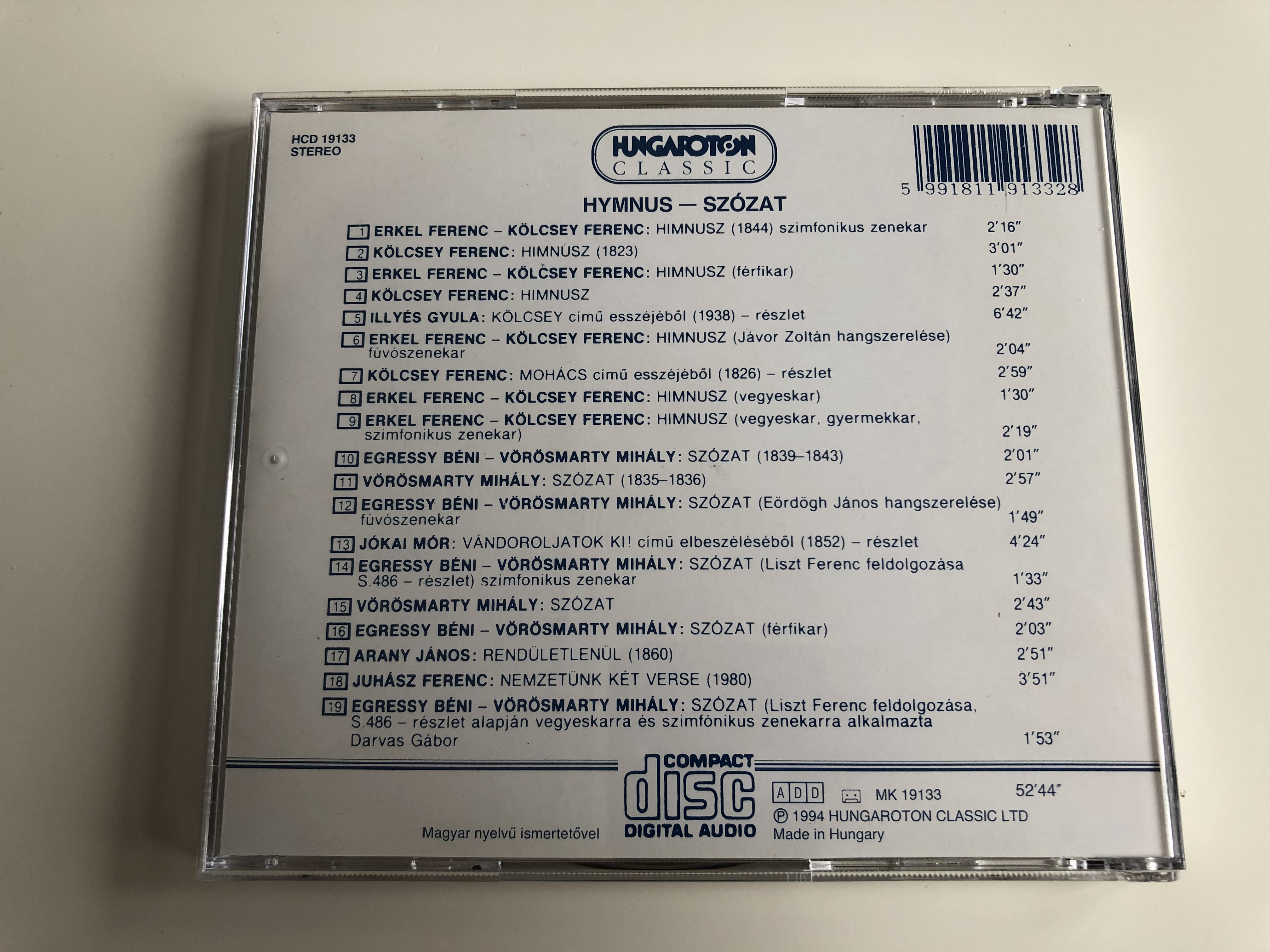Description
Hymnus - Szózat
Hungaroton Classic HCD19133
AUDIO CD 1994
UPC 5991811913328
ADD
Made in Hungary
Magyar nyelvű ismertetővel
Illyés Gyula: Kölcsey - Részlet
Kölcsey Ferenc: Mohács - Részlet
Jókai Mór: Vándoroljatok ki! - Részlet
Arany János: Rendületlenül
Juhász Ferenc: Nemzetünk két verse
A himnusz zenéjét Erkel Ferenc zeneszerző és karmester szerezte 1844-ben.
A Szózat Vörösmarty Mihály megzenésített verse, a magyarok nemzeti éneke, amelyet ma is himnuszként adnak elő.
Vörösmarty Mihály 1836-ban írta meg versét, amely az Auróra nevű almanachban jelent meg 1837-ben. A költeményre Egressy Béni írt zenét 1843-ban, amikor annak megzenésítésére Bartay András, nemzeti színházi igazgató pályadíjat tűzött ki.
Tracklist:
1. ERKEL FERENC (1810-1893) - KÖLCSEY FERENC (1790-1838): HIMNUSZ (1844) (szimfonikus zenekar) (2´16˝)
2. KÖLCSEY FERENC: HIMNUSZ (1823) (3´01˝)
3. ERKEL FERENC - KÖLCSEY FERENC: HIMNUSZ (férfikar) (1´30˝)
4. KÖLCSEY FERENC: HIMNUSZ (2´37˝)
5. ILLYÉS GYULA (1902-1983): KÖLCSEY című esszéjéből (1938) - részlet (6´42˝)
6. ERKEL FERENC - KÖLCSEY FERENC: HIMNUSZ Jávor Zoltán hangszerelése (fúvószenekar) (2´04˝)
7. KÖLCSEY FERENC: MOHÁCS című esszéjéből (1826) - részlet (2´59˝)
8. ERKEL FERENC - KÖLCSEY FERENC: HIMNUSZ (vegyeskar) (1´30˝)
9. ERKEL FERENC - KÖLCSEY FERENC: HIMNUSZ (vegyeskar, gyermekkar, szimfonikus zenekar) (2´19˝)
10. EGRESSY BÉNI (1814-1851) - VÖRÖSMARTY MIHÁLY (1800-1855): SZÓZAT (1839-1843) (2´01˝)
11. VÖRÖSMARTY MIHÁLY: SZÓZAT (1835-1836) (2´57˝)
12. EGRESSY BÉNI - VÖRÖSMARTY MIHÁLY: SZÓZAT Eördögh János hangszerelése (fúvószenekar) (1´49˝)
13. JÓKAI MÓR (1825-1904): VÁNDOROLJATOK KI! című elbeszéléséből (1852) - részlet (4´24˝)
14. EGRESSY BÉNI - VÖRÖSMARTY MIHÁLY: SZÓZAT Liszt Ferenc feldolgozása, S. 486 - részlet (szimfonikus zenekar) (1´33˝)
15. VÖRÖSMARTY MIHÁLY: SZÓZAT (2´43˝)
16. EGRESSY BÉNI - VÖRÖSMARTY MIHÁLY: SZÓZAT (férfikar) (2´03˝)
17. ARANY JÁNOS (1817-1882): RENDÜLETLENÜL (1860) (2´51˝)
18. JUHÁSZ FERENC (1928): NEMZETÜNK KÉT VERSE (1980) (3´51˝)
19. EGRESSY BÉNI - VÖRÖSMARTY MIHÁLY: SZÓZAT Liszt Ferenc feldolgozása, S.486 - részlet alapján vegyeskarra és szimfonikus zenekarra alkalmazta Darvas Gábor (1´53˝)
| 1 | –Erkel Ferenc | Himnusz
Performer – Magyar Állami Hangversenyzenekar* |
2:16 |
| 2 | –Kölcsey Ferenc | Himnusz
Performer – Bessenyei Ferenc |
3:01 |
| 3 | –Erkel Ferenc* És Kölcsey Ferenc | Himnusz
Performer – A Magyar Néphadsereg Művészegyüttesének Férfikara |
1:30 |
| 4 | –Kölcsey Ferenc | Himnusz
Performer – Gábor Miklós |
2:37 |
| 5 | –Illyés Gyula | Kölcsey (Esszé Részlet)
Performer – Koszta Gabriella |
6:42 |
| 6 | –Erkel Ferenc* És Kölcsey Ferenc | Himnusz
Performer – Magyar Néphadsereg Központi Fúvószenekara |
2:04 |
| 7 | –Kölcsey Ferenc | Mohács (Eszé Részlet)
Performer – Kohut Magda |
2:59 |
| 8 | –Erkel Ferenc* | Himnusz
Chorus – A Magyar Néphadsereg Művészegyüttesének Férfikara, A Magyar Rádió És Televízió Gyermekkara*, A Magyar Rádió És Televízió Énekkara* |
1:30 |
| 9 | –Erkel Ferenc* És Kölcsey Ferenc | Himnusz
Chorus – A Magyar Rádió És Televízió Gyermekkara*, A Magyar Rádió És Televízió Énekkara*Orchestra – Magyar Állami Hangversenyzenekar* |
2:19 |
| 10 | –Egressy Béni És Vörösmarty Mihály | Szózat
Chorus – A Magyar Néphadsereg Művészegyüttesének Férfikara, A Magyar Rádió És Televízió Gyermekkara*, A Magyar Rádió És Televízió Énekkara* |
2:01 |
| 11 | –Vörösmarty Mihály | Szózat
Performer – Szabó Gyula |
2:57 |
| 12 | –Egressy Béni | Szózat
Performer – A Magyar Néphadsereg Központi Fúvószenekara |
1:49 |
| 13 | –Jókai Mór | Vándoroljatok Ki! (Elbeszélés Részlet)
Performer – Jobba Gabi |
4:24 |
| 14 | –Egressy Béni És Liszt Ferenc* | Szózat
Performer – Magyar Állami Hangversenyzenekar* |
1:33 |
| 15 | –Vörösmarty Mihály | Szózat
Performer – Kállai Ferenc |
2:43 |
| 16 | –Egressy Béni És Vörösmarty Mihály | Szózat
Chorus – A Magyar Néphadsereg Művészegyüttesének Férfikara, A Magyar Rádió És Televízió Férfikara* |
2:03 |
| 17 | –Arany János | Rendületlenül
Performer – Rajhona Ádám |
2:51 |
| 18 | –Juhász Ferenc | Nemzetünk Két Verse
Performer – Lukács Margit |
3:51 |
| 19 | –Egressy Béni És Liszt Ferenc* És Vörösmarty Mihály | Szózat
Chorus – A Magyar Rádió És Televízió Énekkara*Orchestra – Magyar Állami Hangversenyzenekar* |
1:53 |
- Phonographic Copyright (p) – Hungaroton Classic Ltd.
- Made By – VTCD
- Edited By – Juhász Ferenc, Újfalussy József*, Lukácsy Sándor, Szokolay Sándor*
- Engineer – Lukács Judit*, Kálmán Sándor
- Music Director – Mátyás János*




























